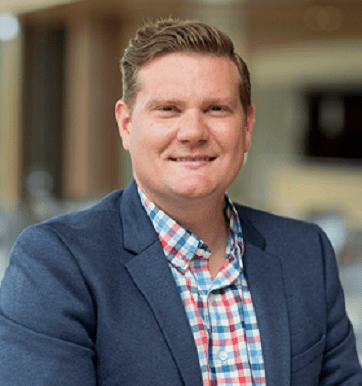Written by Kim Furlow, communications manager, Institute for Public Health
Public Health Faculty Scholar SPOTLIGHT!

Ryan Lindsay, MSW, LCSW
Associate Professor of Practice, Brown School
During his career as a trained clinical social worker who works with individuals experiencing suicidal thinking and behaviors, Ryan Lindsay’s practice and research interests have evolved. Currently, you’ll find him engaged in several research projects with multiple community partners who also operate at the intersection of suicide prevention and intervention.
We recently caught up with Ryan, who is one of WashU’s esteemed Public Health Faculty Scholars and a collaborator with the Center for Community Health Partnership & Research.
What research are you most excited about right now?
Screening and Feedback in Suicide Risk: Research has shown that the way mental health professionals communicate with patients and their families can significantly influence the implementation of prevention strategies. However, the use of clinical terminologies and the stigmatization associated with mental health conditions (especially suicide), often impede the development of positive and productive dialogue. For children and adolescents, especially those from minoritized backgrounds and/or who identify as part of a sexual or gender minority, the challenges are further compounded. These groups face additional barriers to appropriate care such as discrimination, lack of culturally competent care, and fear of stigmatization, which can deter them from openly discussing their feelings and seeking help.
The effectiveness of suicide screenings and subsequent interventions relies heavily on the quality of communication and the degree of understanding and trust established among all involved parties. Despite the structured approach to screenings and in-depth assessments conducted (such as on crisis lines or via school-based screenings), significant gaps persist, particularly in the context of communication between children, parents/caregivers, and health care providers.
Our research team* seeks to understand how youth, family and provider characteristics interact with or influence the process, how acceptable screening and feedback is disseminated among minoritized youth and families, and what similarities and unique differences exist across these populations. The outcome of this research would inform the development of specific communication strategies and training to better optimize the screening process and improve linkage and follow-up for these youth and families. Our hope is that our work would lead to improving existing screening and linkage systems and prevent youth suicide.
*The above work is being conducted in collaboration with Massy Matumba, PhD, (University of Michigan), Rachel Braithwaite, PhD (WashU Brown School), Nhial Tutlam, PhD, (WashU Brown School), Behavioral Health Response and ASPEN Network.
What led you to this research and community partnership?
During my past 15 years in St. Louis, our unique team developed out of relationships I made with community partners amid training and consulting in the field of suicide prevention and interventions. My research collaborators are all affiliated with the International Center for Child and Adolescent Health at WashU’s Brown School, led by Dr. Fred Ssewamala. Drs. Tutlam, Braithwaite, and Matumba were all connected with me through our exploration of research opportunities to address suicidality in African refugee and resettled youth here in St. Louis. All of these relationships have been built through networks, connections, and community participation resulting in a place of trust and engagement in community-partnered work.
How does collaborating with community partners strengthen your work?
I am mostly interested in what is happening in the “real-world.” I deeply value the science that contributes to evidence-based policies and practices; however, it is limited by what actually gets implemented within the community. What community agencies are doing matters a ton, and they are often the source of the most innovative and insightful ideas. So, engaging in academic-community partnerships is crucial to translating science into practice and learning how knowledge can be advanced—all of which is critical in my work.
Specifically, how can community members collaborate around the critical issues addressed in your research?
There is already a lot of very good work around community-based suicide prevention efforts being accomplished in our communities. Work by the St. Louis Regional Suicide Prevention Coalition is a strong example. Community member participation is crucial to unpacking the phenomena of youth suicide. Our team is specifically interested in if and/or how Black parents experience provider communication regarding their child’s suicide risk and we would love to hear from these parents. We want to learn from their experience and ensure that parents’ voices are centered in conversations on youth suicide risk. Parents interested in discussing their experiences, can reach me at rlindsay@wustl.edu.
How has the Center for Community Health Partnership & Research supported your work?
I have formally engaged with the center through events and community partner engagement, and I am looking forward to networking and meeting new community partners or collaborators who work on suicide prevention and intervention projects.
The center has provided significant support for many of the initiatives that I have been involved in through the St. Louis Regional Suicide Prevention Coalition, providing needed sponsorship and leadership for our Speakers Series. Anyone who is interested in viewing archived recordings of the speakers series free of charge are welcome to visit: www.stlsuicideprevention.org/training